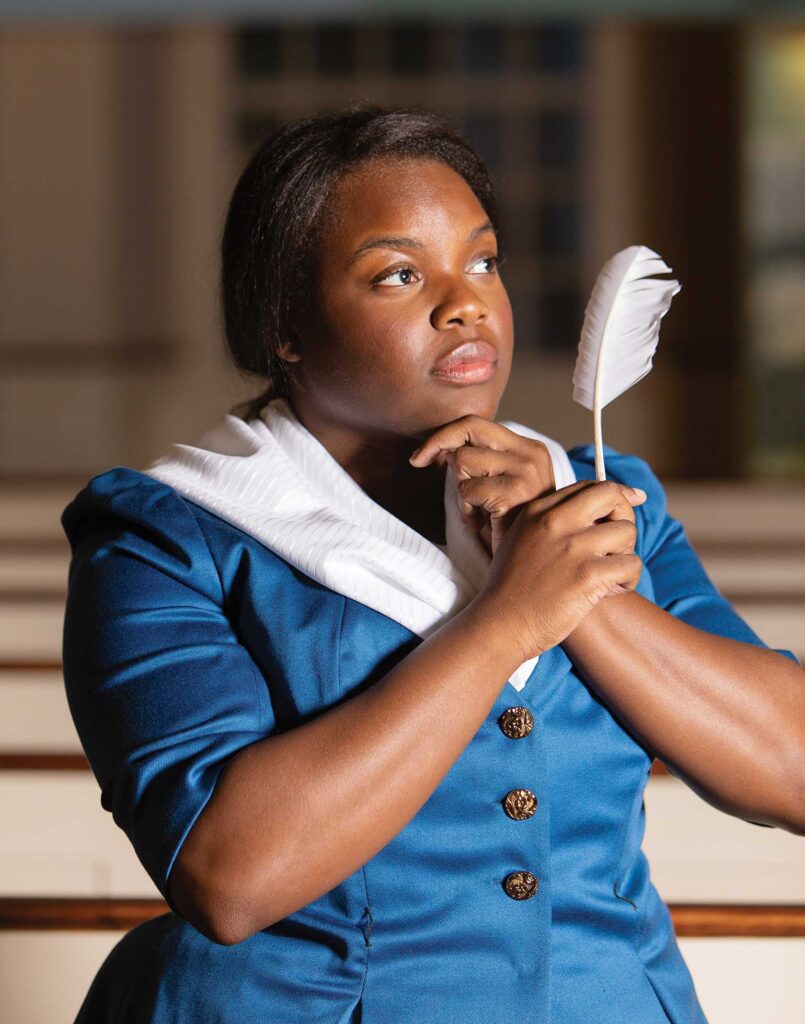
In “Phillis in Boston,” a world premiere play debuting at the Old South Meeting House next month, African American poet and prodigy Phillis Wheatley is in the spotlight. Commissioned by Boston nonprofit Revolutionary Spaces and written by British-Nigerian playwright Ade Solanke, the piece shows Wheatley at a crucial and dramatic crossroads.

Illustration of Phillis Wheatley from her book “Poems on various subjects, religious and moral.” PHOTO: LIBRARY OF CONGRESS
The play centers on a key moment in the celebrated playwright’s life and in the life of the burgeoning United States. In 1773, Wheatley published her first book, the first known book of poetry in English by an African writer and the third book published by an American woman. She had to publish the book in London because Boston publishers refused to work with her. When the books were shipped back to Boston, they were on the same ship as the soon-to-be harbor-soaked tea of Boston Tea Party fame. Audiences meet Wheatley in the tense moment when she tries to retrieve her books.
“We often look for things that are epic, but also intimate,” says Solanke. “So there’s the epic backdrop, the meetings, the marches, the Patriots and the Sons of Liberty. And then you’ve got that intimate story of a young woman whose hopes and fears for a new life may go down with those boats.”
This is not Solanke’s first time digging into Wheatley’s life. “Phillis in Boston” is a companion piece to her earlier work, “Phillis in London,” which explores the acclaim and support the poet found across the pond. Wheatley’s story is rife with natural drama, and many parts of her history haven’t been told on a large scale.
This year marks the 250th anniversary of the Boston Tea Party. Revolutionary Spaces commissioned this play to commemorate that milestone in a way that highlighted an untold piece of the story.
“As we commemorate the 250th anniversary of the Boston Tea Party, which played a pivotal role in the struggle for liberty that drove the American Revolution, it is absolutely critical that we ask, ‘Liberty for whom?’” says Nathaniel Sheidley, president and
CEO of Revolutionary Spaces. “This unique work offers audiences a new way to see the interplay between the struggles for freedom undertaken by enslaved people, women and other colonists.”
“Phillis in Boston” runs at the Old South Meeting House from Nov. 3 through Dec. 3. The show is directed by Regge Life, an Emmy-nominated producer, director and writer, and features Adreyanua Jean-Louis as Wheatley. The Old South Meeting House was a specific and intentional choice to stage the production. It was the largest indoor gathering space in Colonial Boston and would have been an important spiritual and revolutionary home for Wheatley and other revolutionaries of the time.
“Phillis in Boston” tells a lesser-known history about Wheatley’s life and the experience of African Americans during that period. The piece both engages audiences and encourages them to explore shared humanity.
“Racism is helped by the exclusion of these stories, because it helps continue the idea that we are siloed, we are separate, we are so different,” says Solanke. “These stories are important for the creative reason that they’re fantastic stories, but they also can contribute to social progress.”








